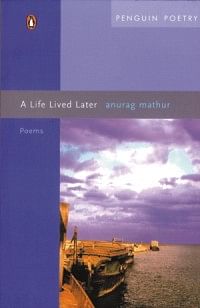Book Review
Scalp scorching
Farhad Ahmed
Anurag Mathur is an established, published writer of prose. His first book was the funny, best-selling The Inscrutable Americans, followed by Making the Minister Smile.He has now published a book of poems. Some of the poems in the collection are okay, readable stuff. Some are bad, as demonstrated by the lines below from 'Night Song':
I was born in the dark,
A child of the shadows,
A creature moon-touched.
My home is the night. Which, when one looks at it steadily, is really quite an extraordinary concatenation of poetic affectation and clichés. The bad poems do not occur frequently enough in the volume for one to just outright dismiss Anurag as a bad poet, but they do occur, and when they do one momentarily experiences a flicker of the tired reviewer's reflex: a sensation in the head, actually right at the top of the skull, happily brief, of the scalp being lightly scorched). Tssst! Then it's over, and you plummet ahead with your Dhaka life. But the majority of the poems are the middling-bad like the one published below, which I think captures the flavour of the volume. Death, Old Friend After the day, the worry,
Closer to the grave I hurry.
Did I paint the day
with the colours of life? Like a lizard, death
watches from the wall,
flicking its tongue,
eyes of blank delight. Death has hypnotic eyes. Only madmen lock eyes
With death, old friend,
Or those already dying,
Who have no life to lose
And who know then that it's over. But you, the living,
Never look at death
Sitting quietly on the wall. It was in the room
When you were born,
Its eyes have never left you
Like an old friend, or enemy.
Who knows when the lizard
Waiting on the wall,
Will flick its tongue
For you? Why does the poem not really work? After all, the poet has a vocabulary of sorts, the lines do weave a snare, and the image of the lizard does work for South Asians as a metaphor of death: that wart of a head, the unblinking eyes, its skin, the cynical lips. Still the poem does not quite reach us inside. Why? It is not that the title is too heavy for the reader, that it immediately raises expectations hardly any poet, let along Anurag, can fulfill--the better approach for a beginning poet is to work with something smaller, far more ordinary, in scale and then reach for the unexpected turn that evokes death; it is not even that the lizard image/metaphor has not really been worked through in the poem, that it is stays too light, too static to evoke the weight, the sheer weight, of the dread of death; it's not even the clichés--death's 'hypnotic eyes' or painting the day with 'colours of life'--though these two are pretty bad (yes, dear readers, there are good clichés, meaning they aren't, pardon the pun, entirely dead, are still usable in certain ways, and there are bad clichés, meaning the suicide-inducing hack stuff, which one mustn't use under any circumstances). No, the real trouble with the poem is that we feel that the poet is straining to write a poem about death (which is why he is making sure in the title that we all know what the subject matter is about), that he is not a natural poet. And so the poem leaves us with that curious effect, not of death or dying, which is its intent, but of a man straining (and this is the part where we look away in embarrassment) to be one. Good poems, like good anything, should never reveal sweat, never show strain. But (and there's always a but, isn't there, but this 'but' is genuine), wondrously, improbably, there is one poem which comes close to being a real poem, with a grimly knowing male wit ('Drunk, Confessional'). It makes one wonder whether Anurag would have been better off writing in that vein. But for the rest, one supposes that when a best-selling author (and Heaven knows there aren't enough of them writing in English) turned up on Penguin's doorstep with this sheaf of poems, presumably the good folks there just couldn't say 'no'. Farhad Ahmed is a freelance writer/translator.
|

Poems: A Life Lived Later by Anurag Mathur; Delhi: Penguin India; 2005; pp. 102 |